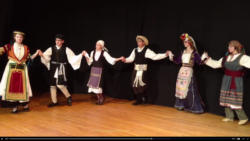auroracoor1
Active member
I love attempting to learn Greek dances but I also think it's important to learn about which region of Greece each dance comes from. Here are some examples that I pulled from the list on this website https://theculturetrip.com/europe/greece/articles/7-traditional-greek-dances-you-should-know-about/
Hasapiko (Constantinople)
Pendozali (Crete)
Tsamiko (Peloponnese, Central Greece, Thessaly, and Epirus)
Ikariotikos (Ikaria)
Hasapiko (Constantinople)
Pendozali (Crete)
Tsamiko (Peloponnese, Central Greece, Thessaly, and Epirus)
Ikariotikos (Ikaria)



